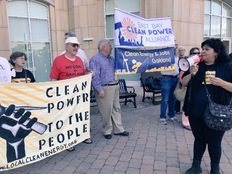
On July 18th, the Board of East Bay Community Energy (EBCE), Alameda County’s new Community Choice energy program, adopted a groundbreaking plan for local clean energy development in the East Bay.
The Local Development Business Plan (LDBP), as it is called, is a roadmap for providing local clean energy benefits in the East Bay by investing in the development of local renewable energy resources. The Plan spells out actions and strategies for promoting local clean energy such as solar, wind, energy efficiency, and energy storage projects. These projects help address the environmental, economic, and social justice needs of the East Bay community.